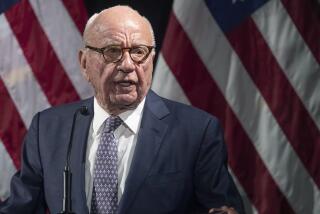Chief Architect of Patriot Act to Quit
WASHINGTON — The Justice Department is losing another key foot soldier in its war on terrorism.
Viet Dinh, the chief architect of the USA Patriot Act, the controversial post-Sept. 11 legislation that greatly expanded law enforcement agencies’ powers to track terrorists, submitted his resignation to the White House on Tuesday, an administration official said.
Dinh, 35, plans to return to teaching at Georgetown University’s law school. His resignation, which officials are expected to formally announce today, is effective May 31.
The planned departure comes as Michael Chertoff, the department’s criminal division chief, is about to be confirmed by the Senate for a federal appellate judgeship in New Jersey. Chertoff is expected to leave the Justice Department next month.
That means the department is losing two of its most visible proponents in its legal attack on terrorists. They will be leaving as the department has considered a sequel to the Patriot Act, news of which has triggered criticism from civil liberties groups.
A number of other key officials have left recently as well. Jay Bybee, head of the legal-counsel office, the department’s internal arbiter of legal questions ranging from the jurisdiction of military tribunals to the exigencies of sentencing corporate defendants, became a federal judge in March.
John Yoo, a Bybee deputy who has served as the office’s international law and national security expert, announced recently that he was returning to teach at UC Berkeley’s law school.
Both Berkeley and Georgetown grant leave to faculty members who accept public service positions, with the proviso that they return within about two years.
Dinh, the assistant attorney general for legal policy, turned a traditionally low-profile operation into a kind of internal think tank with broad influence. Since his confirmation two years ago this month, his office has played an increasingly important role in formulating policy on a wide swath of topics, including gun control, cyber-pornography and the vetting of federal judicial nominees.
But the Patriot Act got Dinh the most attention. It was embraced by conservatives and reviled by the left, which felt that his views ran roughshod over the Constitution.
His ascent to power was made even more remarkable by his personal journey -- a boat refugee from Vietnam who attended high school in Orange County, graduated from Harvard University and its law school and clerked for U.S. Supreme Court Justice Sandra Day O’Connor.
His Patriot Act expanded the authority of government to conduct secret surveillance and searches of citizens and enhanced its powers to detain noncitizens as well as freeze the assets of charities suspected of bankrolling terror groups.
In a bit of vindication, a special federal court last year upheld a provision of the law authorizing closer coordination between government crime-fighters and intelligence agents.
In February, a watchdog group publicized an internal Justice Department memo mentioning that officials were considering a follow-up to the act, dubbed “Patriot Act II.”
The draft document included proposals to nullify existing consent decrees against state law-enforcement agencies and allow the government to keep secret information about people detained as part of a terrorism investigation. Justice officials have described the paper as a work in progress that could be discarded.
President Bush recently said he would nominate Chris Wray, a top aide to Deputy Atty. Gen. Larry Thompson and a former federal prosecutor in Atlanta, to succeed Chertoff. Bush also said he would nominate Jack Goldsmith, a University of Chicago law professor, to succeed Bybee.
More to Read
Sign up for Essential California
The most important California stories and recommendations in your inbox every morning.
You may occasionally receive promotional content from the Los Angeles Times.









